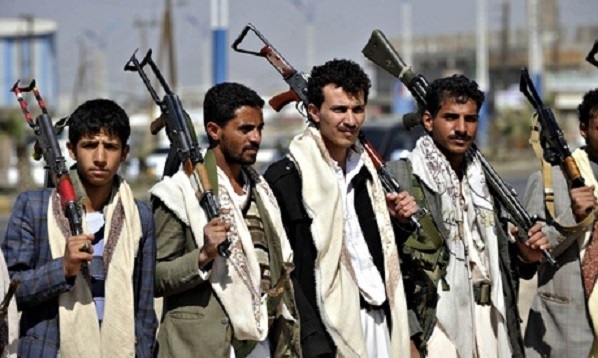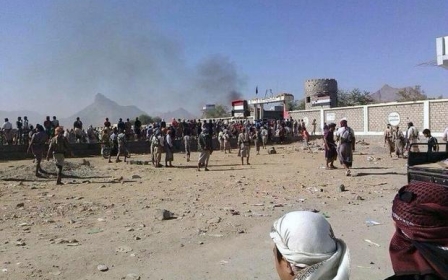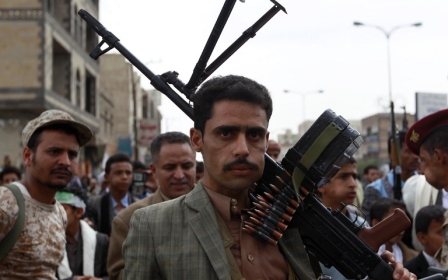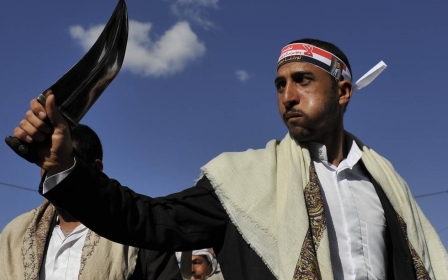Yemen's civil war intensified by executions

Earlier this week, armed men claiming to be members of the Popular Resistance group in Taiz Province executed captive Houthis in Taiz City, dragging some of them through the street.
One of the Houthi captives was executed in the public square, where people gathered to witness the event. The slogan of the Popular Resistance in Taiz appeared on the wall of the square.
People from various provinces and from different sides condemned the executions. It is the first time during the conflict that anyone has witnessed the execution of prisoners of war.
Awarded the Nobel Peace Prize in 2011, Tawakkol Karman said on her Facebook page that the executed Houthi captive was a sniper who had killed dozens of Taiz residents: "However I condemn killing snipers in this way, as the Popular Resistance should not rise to the level of the Houthis' violence in this way."
The Houthi captive was executed after the Popular Resistance advanced in Taiz Province earlier this week.
New MEE newsletter: Jerusalem Dispatch
Sign up to get the latest insights and analysis on Israel-Palestine, alongside Turkey Unpacked and other MEE newsletters
Infiltrators inside the Popular Resistance
Rashad al-Sharabi, a spokesperson for the Popular Resistance in Taiz, told Middle East Eye that the Popular Resistance did not execute Houthi captives in Taiz.
He denied Karman's claim that the executed man was a Houthi sniper, saying: "There are some infiltrators inside the Popular Resistance in Taiz who execute Houthi captives in order to exacerbate violence in Taiz City."
Al-Sharabi confirmed that the leadership of the Popular Resistance in Taiz did not direct its members to execute any captives, even Houthi snipers.
There are dozens of Houthi captives being held by the Popular Resistance in Taiz. But they are being treated according to the instructions of the "Islamic Law" and the Popular Resistance does not torture them, al-Sharabi said.
"The only side who benefited from the execution is the Houthi rebels. After they saw the videos of the captives being slaughtered in Taiz, they immediately started to target Taiz City randomly and dozens of Taiz residents were killed during the last three days, including 17 children," al-Sharabi added.
A member of the Houthis' supreme revolutionary committee told Saba News Agency, on condition of anonymity, that Houthis would take revenge for the captives who were executed in Taiz.
"Those who executed the Houthi captives in Taiz are part of the Houthi intelligence and the Popular Resistance in Taiz is working hard to arrest them," al-Sharai added, saying infiltrators were common in wars.
In one of the execution videos, seen by MEE, people who gathered around were chanting "sniper," giving the impression that they were in support of the killings.
A supporter of the Popular Resistance in Taiz told MEE on the condition of anonymity: "The Popular Resistance has to execute snipers who kill civilians, and all of us know that the Popular Resistance executes Houthi snipers. But after strong condemnation of this act, the Popular Resistance no longer carries out these executions."
"We have to tell the Houthis that Taiz's residents will fight for their city, and they will kill Houthi invaders everywhere in Taiz. We have to tell them that Taiz is the graveyard of the Houthis." the supporter added.
Imitation of IS
During the past week, Houthi newspapers reported that the Popular Resistance in Taiz executed more than 20 captives, mostly from the al-Rumaima area in the Sabir Mountains inside Taiz City.
However, al-Sharabi confirmed that the Popular Resistance hadn't executed any of the fighters that the Houthis reported, and that these fighers had been killed in combat in Taiz.
Hussein al-Boukhaiti, a Houthi activist, told MEE that the Popular Resistance in Taiz imitates Islamic State (IS) members in how they execute people. "The killing of captives provides clear evidence that there are members of IS fighting with the so-called Popular Resistance."
There has so far been no declaration from the Popular Resistance denying the execution of the Houthi captives.
"The Popular Resistance in Taiz implemented mass executions of Houthi fighters. That is why the Houthis continue to try and free Taiz from members of IS," l-Boukhaiti said.
He pointed out that the execution took place on Gamal Street in Taiz City, which is under the control of the Popular Resistance, stating that the Popular Resistance should be held responsible for everything that happens in the areas under their control.
Al-Boukhaiti told MEE that the Houthis have dozens of prisoners, but have not killed any of them.
Taiz residents against executions
Residents of Taiz insist that the Popular Resistance in fact executed the Houthi fighters, even if the Popular Resistance refused to admit it.
Abdulsalam Aref used to be a supporter of the Popular Resistance in Taiz at the beginning of the war. But he began to oppose them after the execution of captured Houthi fighters.
"All of the residents in Taiz know very well that the Popular Resistance executed Houthi fighters to celebreate the victory of the Popular Resistance. The execution happened on Gamal street, a main street in the middle of Taiz, and this is immoral behaviour," Aref told MEE.
On Sunday, the Popular Resistance in Taiz celebrated its victory in new areas in the city. Residents of the city gathered on Gamal Street and lit fireworks in the streets. It was the same day that a Houthi captive was executed on the same street.
Aref said: "I support the Popular Resistance if they are fighting the Houthis to prevent them from invading Taiz, but I do not support them executing people. It is a dangerous sign that threatens the whole country if there are people who slaughter other human beings."
Middle East Eye delivers independent and unrivalled coverage and analysis of the Middle East, North Africa and beyond. To learn more about republishing this content and the associated fees, please fill out this form. More about MEE can be found here.




